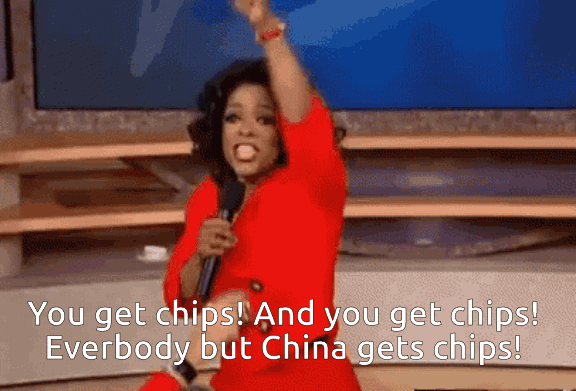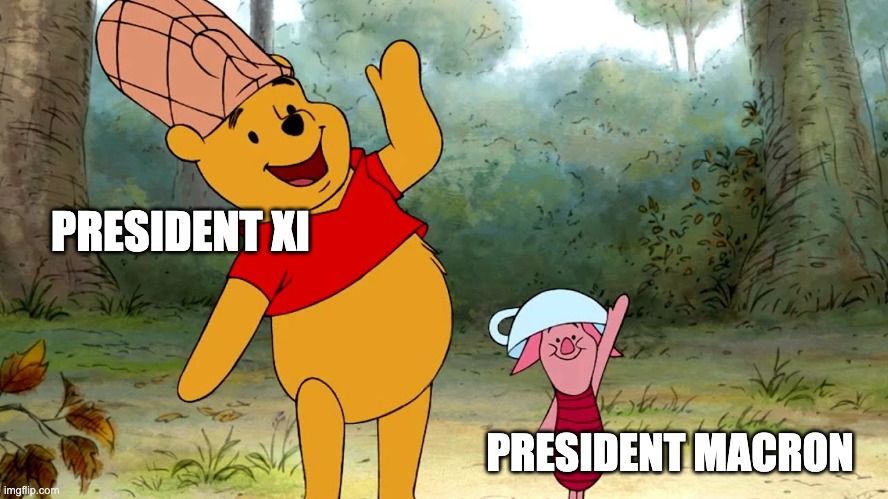Asia Tea Time - Cup 6 ☕
This week, we cover news on the semiconductor chip market, Singapore REIT Mapletree Logistics Trust, and France President Macron’s state visit to China.
Macro in Asia
Southeast Asian countries take bigger share of US chip market

Data released this week showed that the US imported over 80% of its semiconductors from Asia in February 2023.
Southeast Asian countries and India saw the strongest growth, with the latter registering an eye-popping 3,400% increase in shipments – hitting US$152 million for the month.
Why it’s happening
- Who remembers the CHIPS Act passed by the US in late 2022? 🙋🏻♀️ Well in addition to freezing out China from cutting-edge semiconductors and broader chip technology, Uncle Sam also wants to diversify where it gets its chips from in Asia.
- That’s no surprise given Taiwan’s the unofficial G.O.A.T of chipmaking – it makes up around 30% of the global supply of memory chips and has 90% market share of cutting-edge chips. Kind of a big deal, then.
- The bill basically aims to bring more of that chip manufacturing back into the US by providing tax credits and scientific R&D grants.
- Why? Because the US used to be strutting its stuff in the chip world – it manufactured 37% of the world’s semiconductors in the 1990s – but now it finds itself an also-ran by making just 12% of global semiconductors currently.
Why it matters
- It’s not exactly a news flash that China’s chip industry is being pulverised. In the first two months of this year, the country’s chip volumes fell by 27%.
- Is it any surprise that China is salty about the whole thing? At the start of April, Chinese regulators said they would review imports by US chip manufacturer Micron Technology (NASDAQ: MU) on national security concerns.
- The US is already getting its buddies – like the Netherlands and Japan – to restrict their exports of advanced chip-making equipment to China.
What’s next?
- Expect the semiconductor supply chain to see more protectionism. The EU is looking to get in on the act by passing its own Chips Act – looking to double its share of global chip output to 20% in the next 10 years.
Tim’s Take
But it’s clear going forward that countries are going to be providing big incentives to their local chip industries.
- Indeed, only last week, South Korea’s parliament approved the K-Chips Act that will see increased tax credits for large firms investing in semiconductor manufacturing facilities.
- And back in August 2022, chip giant Intel Corporation (NASDAQ: INTC) inked a deal with Brookfield Asset Management that will see the latter’s infrastructure arm invest US$15 billion for a 49% stake in two chip factories Intel is building in Arizona.
- That was a big sign of the times – governments and corporations are trying to figure out how to best insulate chip supply chains from any geopolitical shocks that could emanate from Taiwan.
Company spotlight
Singapore REIT Mapletree Logistics Trust makes a big acquisition

Large Singapore real investment trust (REIT) Mapletree Logistics Trust announced last week that it would be buying eight logistics assets in Japan, South Korea, and Australia for nearly S$1 billion.
It closed its private placement of new units shortly after, raising S$200 million in equity at the top of its indicative price range.
Why’s it news?
- Singapore’s REITs have been quiet on the acquisition front so far in 2023. Go figure, interest rates are hotter than a Singapore summer day.
- But this mega-deal brings in eight logistics assets (six in Japan, one in Seoul, and one in Sydney) into Mapletree Logistics Trust’s portfolio. Sounds sweet.
Why it matters
- You know how your parents say never to borrow what you can’t afford? Well, isn’t getting a mortgage and buying property the same thing?
- Likewise, REITs grow based on taking on debt. So, a deal of this size better have upside for shareholders and it seems that it does.
What’s next?
- After a very strong 2021 for foreign acquisitions by Singapore REITs – they hit an all-time high that year – 2022 and 2023 have been slow going.
- No surprises there but could the putative pause in rate hikes by the Fed signal a pickup in deal activity in Singapore’s REIT market?
Tim’s Take
- Mapletree Logistics Trust is a giant of the Singapore REIT market and it owns and operates 186 properties across nine Asia-Pacific markets.
- So, clearly, it’s diversified and tapping into the major demand for logistics space across Asia.
- It was perhaps no surprise to see that the private placement for the REIT’s new units were 3.9 times subscribed, meaning there was a lot of institutional interest in the acquisitions.
- As a result, Mapletree Logistics Trust could raise the S$200 million in equity at the top of its price range.
- With interest rates looking like they may pause at current rates (but not exactly be cut), REITs in Singapore may finally catch a break.
Making up over 70% of the overall purchase price for the eight properties, the tight supply and low vacancy rates in Japan’s logistics hubs highlights to investors that real estate in specific sectors in the Land of the Rising Sun still carries appeal.
Story of the week
France President Macron’s state visit to China

It was interesting to see the movers and shakers in the political world making their rounds in the past week.
We had President Tsai Ing-wen capping off a rather uneventful visit to the US and meeting with House Speaker Kevin McCarthy.
What caught my eye, though, was France President Macron’s state visit to China where he’s been trying to convince President Xi Jinping to “bring Russia to its senses”.
Perhaps in a throwback to the Obama and Xi meeting in 2013 – when the two world leaders were likened to jovial friends Pooh and Tigger in A.A. Milne’s children books – Macron could play the part of Piglet.
Trying to bring Russia, China, and the US to the negotiating table could be a step too far for Macron.
However, from the perspective of a Western leader, and judging by the French business contingent that travelled with him to China, he seems to be trying to build a functional bilateral relationship with Xi.
